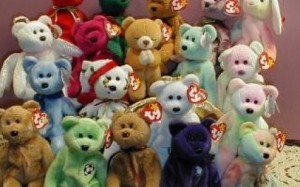This content is missing.
Tag: collecting
Bankrupt by Beanies and Collecting Lessons to Learn
The front page of Yahoo! highlighted an article about a short film entitled Bankrupt by Beanies which introduces the world to a family who became addicted to purchasing Beanie Babies in the mid-1990s. The family went to great extents to purchase as many Beanie Babies as possible and believed the collectibles would eventually appreciate to a point in which they could pay for the children’s education. There are many lessons to learn from Bankrupt for Beanies.
 Collecting for Money is a Gamble
Collecting for Money is a Gamble
If you are collecting items with the intent of selling for more money in the future – you are gambling. In Bankrupt by Beanies, the highlighted family perceived a future value much higher than the current value. They obviously did not perceive how the market might change. We should never assume our collections will pay for future events because nobody can predict all the permutations of a market.
Bankrupt by Beanies and Market Bubbles
Any market can burst. In this case, the Bankrupt by Beanies family did not pay attention to particular signs which point to when a market would burst. This is not necessarily their fault as most collectors don’t pay attention to certain indices such as a constant flood of “special” or “unique” offerings, the emergence of a high number of market speculators, the influx of non-traditional collectors, prices instantly rising on all new releases, and statements from manufacturers on how collectible certain items are. The market bubble burst, and thousands of people were left holding the (bean) bag.
Obsessive Collecting
I am a strong supporter of having goals, and doing what you can to achieve them but there is a line between trying to complete collecting goals, and becoming obsessed with a collection. Bankrupt by Beanies explains how the family in question would recruit neighbors, keep their kids out of school, and go through plans of attack on the days new Beanie Babies came out. This all points to obsessive collecting. When you believe that picking up $5.95 colored bags of beans are more important than your children’s education – there is something wrong.
Non-Traditional Collectors
I never trust markets which focus on non-traditional collectors. You don’t have to watch Bankrupt by Beanies to know that the Beanie Babies market essentially focused on middle-aged women and the elderly. For many of these people, Beanie Babies were the first collectible they ever “invested” in. Items such as Beanie Babies and Llyadro figurines try to drag in people who are naïve to collecting in order to make as much money in as short of an amount of time as possible. We need to be quick to identify these markets and avoid them.
In the End
Bankrupt by Beanies should be a reminder to all collectors to be cognitive of warning signs in the collector’s market. Don’t get burned like this family did.
What Type of Comic Book Collector Are You?
Are you a general comic book collector, a mixed collector, or a specialized comic book collector? Do you know the differences between each type of collector? After reading this article – you will.
General Comic Book Collector
An easy way to remember what a general collector is would be to think of this type of person as a diversified collector. His or her collection will have comics from various comics from various time periods. Many comic book collectors fall into this category as the collector either collects any comics she can come across or any comics she likes.
Specialized Comics Book Collector
A specialized comic book collector will only collect certain types of comics, the comics of a particular character or team, or the comics from a particular company. If you have been collecting for a long time, chances are good that you have met someone who only collects comics focused on the X-Men or Batman or a comic book collector who would never allow comics from the Big 2 in their independent comics collection. You might have met someone who is only interested in horror comics or comics from a particular company.
Mixed Comic Book Collector
Most comic book collectors would fall into this category since they might have some specialized lines in their collections, but will still be diversified. My collection has a strong focus on the 1970s, and on particular characters such as Doctor Strange, The Phantom Stranger, and Batman – but I still have comics from many other publications and titles for various reasons ranging from liking a particular line to simply liking a particular cover to a certain issue being a key issue in a title.
Advantages and Disadvantages
A general or mixed collector will never have a “complete” collection, but a specialized collector might. It gives the specialized collector something to work towards and a goal to focus on. Essentially, this gives a specialized collector a defined maximum number of comics he or she might have. A general or mixed collector can, over time, become overwhelmed by a huge collection which needs to be liquidated to make room.
At the same time, though, a specialized collector might have to pass on particular issues outside of her collection and kick themselves later. I friend of mine only collects horror comics and once passed on purchasing Avengers #7 at a resale shop because it did not fit into his collection. He became so consumed by the idea of only buying horror comics that he did not think about purchasing the early issue of the Avengers and simply trading it in at his local comic book store or selling it for money.
A general or mixed collector is typically going to have a wider view on the comic book industry since he or she will have various types of titles in the collection. Diversification is something which drives a comic book industry which is filled with hundreds of titles to choose from. Specialized collectors, though, can also have a major impact on the market since they can help to entitle a sub-genre (such as horror, science fiction, etc.) to more attention from the publishing companies.
In the End
It comes down to what type of comic book collector you want to be. There is nothing inherently wrong with any type of comic book collector, but each type has advantages and disadvantages over the others.
What type of comic book collector are you? Why is this type of collecting right for you?
